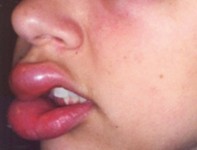Peer Reviewed
Feature Article Immunology and allergy
Hereditary and acquired angioedemas: rare but potentially life-threatening
Abstract
Angioedema without urticaria should prompt consideration of hereditary, or acquired, C1 inhibitor deficiency-associated and ACE inhibitor-induced angioedema. These rare forms require different management to urticaria-associated angioedema as they do not respond to antihistamines, corticosteroids and adrenaline.
Key Points
- Angioedema most often occurs in association with urticaria and usually then responds to treatments used for the urticaria.
- When angioedema occurs without urticaria, consider hereditary angioedema, acquired angioedema associated with C1 inhibitor deficiency and ACE inhibitor-induced angioedema.
- Hereditary angioedema is rare but must be identified as it can be life-threatening. Treatments include C1 INH concentrates, icatibant and ecallantide. Danazol and tranexamic acid are used for prophylaxis.
- Treatment of the underlying disease generally relieves symptoms in patients with the very rare acquired angioedema associated with C1 inhibitor deficiency.
- ACE inhibitor-induced angioedema is an important cause of angioedema in older people, and may be life-threatening.
Purchase the PDF version of this article
Already a subscriber? Login here.

